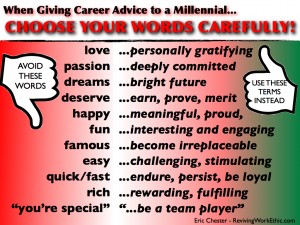The unemployment/underemployment problem facing Millennials predates the Great Recession.
It goes back to the early programming they received from their parents when the economy was booming in the early 2000’s. And parents haven’t let up.
“Follow your dreams.” “Find your passion.” “You’ve got to love what you do.”
Dreams? Passion? Love?
The “follow your dream” problem
Sounds more like the teaser copy on the back of a smutty romance novel than sage career advice.
The mindset of today’s parents is all about getting their kid to aim for the stars, to believe their dream, and to never listen to the doubters and naysayers. It’s almost as if they’re fixated on being their kid’s coach, counselor, publicist, and No. 1 fan.
And who can argue with the “follow your dream” theory of living life? Don’t you hope with everything that is in you that your children someday end up in their dream job, doing exactly what they want to do?
So if your kid is a better-than-average short stop on a little league team, why not tell them they could be the next Derek Jeter? If they make the traveling show choir while they’re in high school, why not illuminate a glorious path that leads to the bright lights of Broadway?
Media perpetuates the fantasy
When interviewed, virtually every contestant on the plethora of talent-based reality shows mentions that they are pursuing their lifelong dream. As one finalist on American Idol so aptly put it, “I’m sick and tired of making pizzas. It’s time that I stop working my butt off and start living the life I was intended to live.”
That contestant, by the way, was 17.
Stop laughing long enough to take a look at the job title on your business card. Is that what you dreamed about when you were 17? Did you vigorously pursue that position out of some deep sense of passion and love?
Not likely. Yet, that doesn’t mean you’re not passionate about what you do. You might even go so far as to tell others that you love what you do.
But if I asked what your dream job is, I bet dollars to donuts you’d mention something other than what is printed on your business card.
Millennial disillusionment
There’s no arguing that the emerging workforce has been bombarded with an endless stream of messages telling them to pursue their passion, to do only that which makes them happy, and to settle for nothing but the best. While this is intended to be inspirational, motivational, and aspirational, it’s misguided career advice that’s leading youngsters to pursue that which only a tiny fraction ever realize.
In a recent study, three times as many middle school girls said they wanted to grow up to be a personal assistant for a famous person as wanted to be a U.S. Senator, and four times as many of the girls picked that assistant job over being a CEO of a major corporation.
No wonder a third of 25- to 34-year-olds (the oldest members of the Millennial generation) currently live with their parents.
Young people are completely brainwashed, resistant to settle for a job they feel is beneath them. So they are not about to “launch” until they can find the career position they have been pre-conditioned to believe they are destined for.
Is there a silver bullet solution?
It’s difficult to unwind this ball of twine without emotionally rocking the psyche of young people who’ve been victims of 20-plus years of pathetic career advice. Somehow, someway, they need to be exposed to the reality that a getting a job, keeping a job, and advancing in a job requires hard work, dedication, self-sacrifice, and plenty of patience.
 They need to be told early and reminded often that work is work and fun is fun. That isn’t to say that one can’t enjoy work or have fun while they are at work, but work is not designed to be fun, nor is it intended to make those who perform it rich, famous, and happy.
They need to be told early and reminded often that work is work and fun is fun. That isn’t to say that one can’t enjoy work or have fun while they are at work, but work is not designed to be fun, nor is it intended to make those who perform it rich, famous, and happy.
So next time a young person comes to you seeking direction when looking for a job, or even greater, is contemplating a career path, consult this chart (left) to guide that conversation.
While you will risk being thought of as a “dream buster,” you’ll be able to look yourself in the mirror knowing you didn’t perpetuate a fantasy that will ultimately lead to shattered expectations.
This was originally published on Eric Chester’s Reviving Work Ethic blog. His new book is Reviving Work Ethic: A Leader’s Guide to Ending Entitlement and Restoring Pride in the Emerging Workforce. For copies, visit revivingworkethic.com.
